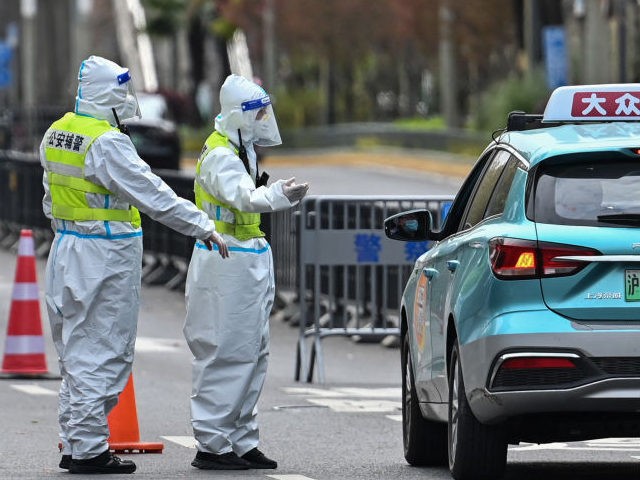China’s state-run Global Times on Monday boasted that repressive coronavirus lockdowns imposed on Chinese cities will keep monkeypox, a disease spreading at slow rates in some parts of the world, at bay.
The Chinese Communist paper cited a warning from the World Health Organization (W.H.O.) that monkeypox infections could spread during the summer holiday season to confidently declare that none of that spreading will be happening in locked-down China:
Although no case has been reported so far in China, Chinese research institutions and experts have been paying close attention. The rare cases outside known epidemic areas of Africa suggest a potential epidemic in those places, posing a risk to China.
As many countries have lifted bans for international travel, there is high risk of continued transmissions, an expert with the Chinese Center for Disease Control and Prevention told the Global Times on Sunday on condition of anonymity.
As the Global Times admitted between bouts of congratulating Chinese officials for distributing test kits and restricting travel to keep the latest pandemic threat at bay, the monkeypox is not nearly as contagious or dangerous as the Chinese coronavirus and existing smallpox vaccines are generally effective at treating it.
The Global Times alluded to a politically sensitive hypothesis that is just beginning to attract Western media attention that the monkeypox outbreak might be traceable to a few specific “super-spreader” events in Europe – events that involved a type of activity that is frowned upon in China:
According to WHO official David Heymann, an infectious disease specialist, monkeypox is now being sexually transmitted as most of the cases are detected at sexual health services.
The CDC expert said that China’s [Chinese coronavirus] control measures in place and largely reduced international arrivals minimize the risks of contagion in China.
Dr. David Heymann is an advisor to the World Health Organization (W.H.O.) and a former department head, but not a current W.H.O. official, as the Global Times claimed. On Friday, Heymann chaired a meeting of a W.H.O. advisory group to assess the monkeypox outbreak, which currently consists of about a hundred cases spread across the U.S., Europe, and Australia. No fatalities have been reported so far.
Heymann’s group concluded there is no evidence to suggest monkeypox, which usually infects a modest number of humans in parts of Africa every year, has become more contagious. Instead, the “highly unusual” outbreak appears traceable to “sexual transmission among gay and bisexual men at two raves held in Spain and Belgium.”
“We know monkeypox can spread when there is close contact with the lesions of someone who is infected, and it looks like sexual contact has now amplified that transmission,” Heymann explained to the Associated Press (AP) on Monday.
Heymann clarified that monkeypox is not a sexually-transmitted disease (STD) per se. It spreads through close contact, including respiratory droplets and secretions from the sores that characterize the disease. Activity that leads to such close contact naturally allows monkeypox to spread more rapidly.
German government health officials advanced the same theory in a report viewed by the AP, which said Germany’s four confirmed monkeypox cases are linked to “party events including on Gran Canaria and in Berlin, where sexual activity took place.” Spanish health officials are investigating possible links between their outbreak and a gay pride event in the Canary Islands.
“U.K. officials have said ‘a notable proportion’ of the cases in Britain and Europe have been in young men with no history of travel to Africa and who are gay, bisexual or have sex with men. Authorities in Portugal and Spain also said their cases were in men who mostly had sex with other men and whose infections were picked up when they sought help for lesions at sexual health clinics,” the AP noted.

COMMENTS
Please let us know if you're having issues with commenting.